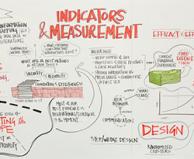Global HIV Consultation Concludes with Commitment to Bolstering Evidence
 Through the benefit of diverse perspectives, participants at the HIV Expert Consultation were determined and driven to move the field of health communication (HC) and HIV prevention forward. With an agenda running ahead of schedule and the option to wrap up early, participants demonstrated their commitment by taking advantage of the extra time to delve into next steps.
Through the benefit of diverse perspectives, participants at the HIV Expert Consultation were determined and driven to move the field of health communication (HC) and HIV prevention forward. With an agenda running ahead of schedule and the option to wrap up early, participants demonstrated their commitment by taking advantage of the extra time to delve into next steps.
The morning started off with a review of the discussion so far, keeping in mind how best to fill gaps in the literature and disseminate recommendations for improving HC methods and measurements. Much of the discussion circled back to the point that research evaluating behavioral interventions often looks at intermediate outcomes of HIV incidence, such as self-efficacy and interpersonal communication, rather than incidence itself. A greater understanding of the process of behavior change and causal pathways was emphasized throughout the meeting.
The group discussed the importance and urgency in getting more of the rigorous evidence that exists for HC into peer-reviewed literature. The wealth of experience and data by researchers not present in the meeting was also acknowledged and considered in discussions for possible next steps and additional publications.
Not only is this evidence needed in the literature, it also must reach our colleagues in the field, including both research and program staff. Alternatives to peer-reviewed literature for disseminating the results of the meeting were also discussed. Some of those channels will include upcoming webinars and a series of fact sheets. How, when and where this evidence is shared is critical so partners in developing countries may also draw on it and use it.
The meeting allowed participants to network, share experiences and gather input on each other’s work, which was a valuable part of the consultation. While participants eventually went their own ways, a clear dedication and commitment to work together in moving forward the discussion was made. We know HC has an impact on HIV prevention. This consultation highlighted the importance of how we must continue to tackle the question of how best can we use HC most strategically in combination prevention. HC3 invites others to join in this ongoing conversation.





Leave a Reply
Want to join the discussion?Feel free to contribute!